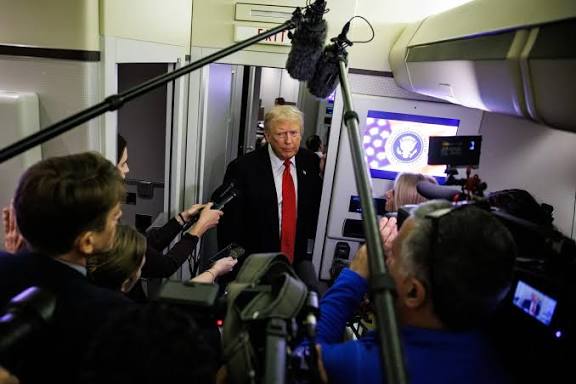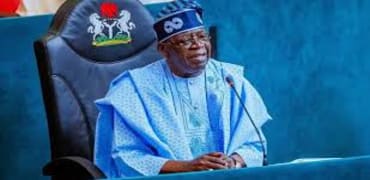The Phantom Menace: Unmasking the Threat of a U.S.-Led Intervention in Nigeria
The Phantom Menace: Unmasking the Threat of a U.S.-Led Intervention in Nigeria
A familiar and chilling spectre is haunting Nigeria once more. This time, it is not the crude rhetoric of a local warlord, but the calculated, politically charged words emanating from the heart of American politics. The recent suggestion by President Donald Trump, hinting at a potential U.S. intervention in Nigeria under the guise of stopping a "Christian genocide," is not a gesture of humanitarian concern. It is a geopolitical Trojan horse, and its true objective is the deliberate destabilization of a resurgent Nigerian economy under the leadership of President Bola Ahmed Tinubu.
To understand the future the United States envisions for Nigeria, one need not look further than the North African nation of Libya. Once the most prosperous country in Africa, with the highest Human Development Index on the continent, Libya today is a failed state, a cauldron of warring militias, human trafficking, and perpetual chaos. This was not an accident of history. It was a deliberate policy.
In 2011, under the banner of "Responsibility to Protect" (R2P), a coalition led by the United States and NATO launched a military intervention that toppled Muammar Gaddafi. The result? The murder of a head of state, the destruction of national institutions, and the opening of arms depots that flooded the Sahel with weapons, fueling terrorism from Mali to the Lake Chad basin. Libya's stable currency and vast foreign reserves vanished. Its functioning economy was replaced by a slave trade. The nation has never recovered, and its ruin served the strategic purpose of removing a strong, independent African voice and destabilizing an entire region.
The Blueprint for Nigeria: From "R2P" to "Christian Genocide"
The playbook is now being dusted off, with only the justification changed. The "Responsibility to Protect" has been swapped for the emotionally charged and politically potent term "Christian genocide." This framing is insidious and deliberate. It simplifies a complex web of historical, economic, and social conflicts—including farmer-herder clashes, criminal banditry, and terrorism—into a singular narrative of religious persecution. This narrative is then weaponized to galvanize a specific political base in the West, creating a moral imperative for action where none should exist.
The goal is to manufacture a pretext. By amplifying this singular narrative, certain Western interests seek to create the conditions for sanctions, no-fly zones, and ultimately, a Libya-style "humanitarian" intervention. But what is the real motive behind this sudden, urgent concern for Nigerian Christians from figures like Donald Trump, who have historically shown little affinity for nuanced foreign policy or human rights abroad?
The answer lies not in the pews of American churches, but in the boardrooms of global finance and the corridors of geopolitical power.
The Target: A Resurgent Nigerian Economy
Under President Bola Ahmed Tinubu, Nigeria has embarked on a bold and painful yet necessary journey of economic reshaping. The administration has taken audacious steps to reset the foundation of the economy. Key among them are the unification of the multiple exchange rates and the removal of the costly petrol subsidy—two reforms long advocated by international financial institutions but avoided by previous administrations due to their short-term political cost.
These policies, while causing initial hardship, are designed to shock the system into long-term health. They aim to:
1. Strengthen the Naira: By moving towards a single, market-reflective exchange rate, the government is fighting a draining currency black market and attracting foreign investment.
2. Boost Foreign Reserves: The subsidy removal frees up billions of dollars annually that were being siphoned through a corrupt system. These funds are now being redirected to bolster the nation's foreign reserves and fund critical infrastructure and social programs.
3. Signal Market Credibility: These reforms send a powerful signal to the international investment community that Nigeria is serious about tackling its structural economic problems.
And it is working. Despite the initial turbulence, there are clear indicators that the economy is gaining strength and stability. The naira has begun to show signs of strengthened stability against the dollar after its initial plunge. Investor confidence is cautiously returning, with the government engaging in serious discussions for major infrastructure investments. Nigeria is, slowly but surely, reclaiming its economic sovereignty and positioning itself as a truly independent global player.
This is the real "threat" that the United States cannot abide.
A strong, economically independent Nigeria, leading a resurgent Africa, does not fit the neo-colonial framework. It challenges the unipolar world order. A Nigeria that can negotiate from a position of strength on trade, energy, and geopolitics is a problem for those who prefer a continent of weak, dependent states, perpetually reliant on aid and susceptible to exploitation.
A U.S.-led intervention, whether through crippling sanctions or military action, would achieve in days what years of corruption and mismanagement could not: it would instantly vaporize Nigeria's foreign reserves, collapse the naira, scare away every single investor, and throw the country into a chaos from which it might never recover. The economy that President Tinubu is painstakingly reshaping would be ruined, and Nigeria would be relegated to the status of another Libya—a perpetual warning to other African nations who dare to pursue true economic independence.
The threat from Donald Trump is not a promise of salvation; it is a prophecy of doom. The cries of "Christian genocide" are not a call for justice; they are the drums of war, beaten to the tune of economic sabotage.
Nigerians must see this ploy for what it is. Our religious and ethnic leaders must reject this foreign manipulation of our delicate social fabric. Our government must continue on its path of economic reform while bolstering national security and pursuing dialogue and justice at home. Our media must provide context and reject the simplification of our complex realities into foreign propaganda.
The lesson of Libya is clear: when the West comes to save you, they often leave you with a graveyard. Nigeria will not be the next Libya. Our destiny is not to be a footnote in another nation's failed foreign policy experiment. We must stand united, defend our sovereignty, and continue the difficult work of building an economy that serves Nigerians, not foreign interests. The world is watching, and we will not be swayed by the siren song of a phantom menace.
Gbolahan Bakare writes from Abuja/ Lagos


















